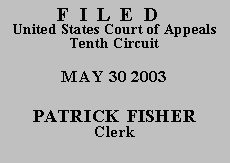

| JOHNNY E. JONES, |
|
| v. | |
| NEXT DAY MOTOR FREIGHT,
INC., |
|
Johnny E. Jones filed this pro se action against Next Day Motor Freight, Inc. (Next Day), alleging that Next Day failed to hire him on the basis of his race. Mr. Jones asserted claims under Title VII of the Civil Rights Act of 1964, 42 U.S.C. §§ 2000e through 2000e-17, and 42 U.S.C. § 1983. He sought to recover compensatory and punitive damages. The district court granted summary judgment to Next Day on both the Title VII and § 1983 claims.
With regard to Mr. Jones's Title VII claim, the court noted that Mr. Jones had filed a charge of discrimination with the Equal Employment Opportunity Commission (EEOC) on October 3, 2001 and had received a right to sue letter on October 19, 2001. The letter informed Mr. Jones that he had ninety days from the date of receipt to file a lawsuit. On October 27, 2001, Mr. Jones wrote a letter to the EEOC requesting that the agency interview a Next Day employee (Ed Miller) who had information about the hiring process. On November 5, 2001, the EEOC's district director sent Mr. Jones a letter declining the request to interview Mr. Miller and again informing Mr. Jones that he had ninety days from his receipt of the right-to-sue letter to file a lawsuit. Mr. Jones did not file this lawsuit until February 5, 2002, 109 days after receiving the right-to-sue letter. Concluding that the circumstances did not warrant equitable tolling of the ninety-day time limitations period, the district court held that Next Day was entitled to summary judgment on Mr. Jones's Title VII claim.
As to the § 1983 claim, the court observed that Mr. Jones had failed to offer any evidence or argument that Next Day was a state actor: "[Mr. Jones] does not allege misuse of governmental power, nor does the record show that [Next Day] was acting under color of law in failing to hire [Mr. Jones]." Rec. doc. 19, at 6 (Order Granting Defendant's Motion for Summary Judgment, filed Dec. 19, 2002). See generally Scott v. Hern, 216 F.3d 897, 906 (10th Cir. 2000) ("To state a cause of action under 42 U.S.C. § 1983 . . . the challenged conduct must . . . [be] fairly attributable to the state.") (internal quotation marks omitted).
On appeal, Mr. Jones challenges only the grant of summary judgment to Next Day on his Title VII claim. Upon de novo review of the record, see Mattioda v. White, 323 F.3d 1288, 1291 (10th Cir. 2003), we conclude for substantially the same reasons as the district court that the grant of summary judgment to Next Day is warranted.
Under 42 U.S.C. § 2000e-5(f)(1), Mr. Jones had ninety days in which to file suit after receipt of an EEOC right-to-sue letter. Witt v. Roadway Express, 136 F.3d 1424, 1429 (10th Cir. 1998). This ninety-day requirement operates like a statute of limitations and is thus subject to waiver, estoppel, and equitable tolling. Jarrett v. US Sprint Communications Co., 22 F.3d 256, 259-60 (10th Cir. 1994). "The ninety-day limit begins to run on the date the complainant actually receives the EEOC right-to-sue notice." Witt, 136 F.3d at 1429.
Here, Mr. Jones stipulated that he received the right-to-sue letter on October 19, 2001--more than ninety days before he filed this lawsuit. See Rec. doc. 14, at 3 (Pretrial Order, filed Oct. 30, 2002). Although he received a second letter from the EEOC on November 5, 2001, Mr. Jones also stipulated that the second letter reminded him that he had ninety days from receipt of the right-to-sue letter to file the lawsuit. Id. at 4. Accordingly, Mr. Jones's complaint is untimely.
Moreover, "[i]n this circuit, a Title VII time limit will be tolled only if there has been active deception of the claimant regarding procedural requirements." Jarrett, 22 F.3d at 260 (emphasis in original). There is no indication of such active deception here: EEOC officials informed Mr. Jones of the limitation period. Accordingly, equitable tolling of the ninety-day limitations period is not warranted.
Accordingly, we AFFIRM the district court's order granting summary judgment to the defendant Next Day on Mr. Jones's claims.
Entered for the Court,
Robert H. Henry
Circuit Judge
*. This order and judgment is not binding precedent, except under the doctrines of law of the case, res judicata, and collateral estoppel. The court generally disfavors the citation of orders and judgments; nevertheless, an order and judgment may be cited under the terms and conditions of 10th Cir. R. 36.3.